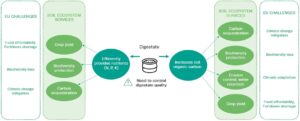EU Soil Monitoring Law proposal and digestate
Soils are the foundation of our agri-food systems, they regulate the nutrient, carbon and water cycles and they provide a habitat for biodiversity. They also play an essential role in the circular economy and adaptation to climate change. Nevertheless, today 60 to 70% of European soils are unhealthy due to climate change, extreme weather events, unsustainable soil management, intensification of agricultural practices, industrial activities, etc. These drivers of soil deterioration will not decline in the future unless a proper legislation is implemented. It is therefore necessary to ensure that EU soils are protected and that all soils are in healthy condition by 2050, as envisioned in the EU Soil Strategy in 2021.
The proposal for the Soil Monitoring Law, published by the European Commission on 5 July 2023, is the first measure implementing the Strategy. It provides a harmonised definition of soil health, sets a comprehensive monitoring and assessment framework of soil health and supports sustainable soil management as well as remediation of contaminated sites. The proposal also foresees setting-up of a soil health certification, the inclusion of anaerobic degradation/digestion as a remediation technique for contaminated sites and the recognition of the prioritization of “circular solutions that enrich the organic content” as a sustainable soil management principle.
According to the European Biogas Association (EBA), these provisions are a positive development that could stimulate the use of digestate – one of the co-products of biogas production. Digestate application to agricultural soils is a sustainable agronomic practice which has a positive impact on various soil ecosystem services. By acting both as an excellent fertiliser which provides recycled available nutrients, and as a soil improver that builds up soil organic carbon, digestate increases crop yield and biomass production, provides a habitat for biodiversity, enables greater carbon sequestration in the soil and helps to control erosion and retain water.
EBA will closely follow the legislative work on the Soil Monitoring Law and promote the use of digestate as a fully-fledged sustainable fertiliser and soil improver.
